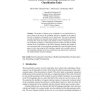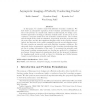115 search results - page 15 / 23 » Estimating the Lengths of Memory Words |
TASLP
2008
13 years 7 months ago
2008
Abstract-- Speaker space based adaptation methods for automatic speech recognition have been shown to provide significant performance improvements for tasks where only a few second...
FSE
2006
Springer
13 years 11 months ago
2006
Springer
In this paper we present new and more accurate estimates of the biases of the linear approximation of the FSM of the stream cipher SNOW 2.0. Based on improved bias estimates we als...
PRIS
2004
13 years 8 months ago
2004
Abstract. The number of features to be considered in a text classification system is given by the size of the vocabulary and this is normally in the range of the tens or hundreds o...
SIAMSC
2010
13 years 5 months ago
2010
In this paper, we consider cracks with Dirichlet boundary conditions. We first derive an asymptotic expansion of the boundary perturbations that are due to the presence of a smal...
ICASSP
2011
IEEE
12 years 11 months ago
2011
IEEE
In this paper, we describe a novel speaker adaptation algorithm based on Gaussian mixture weight adaptation. A small number of latent speaker vectors are estimated with non-negati...


